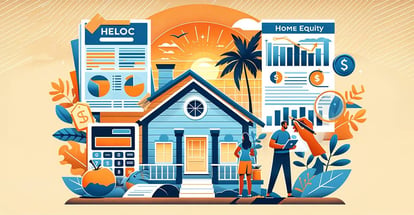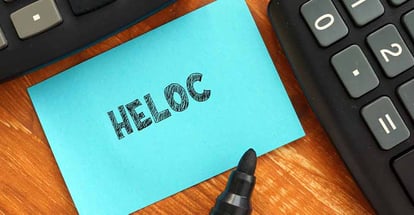How Does One Pay Off Their HELOC?
Wondering how to pay off your HELOC?
With more homeowners tapping into their rising equity, it's essential to have a plan.
Using a HELOC can help manage high-interest debt and reduce your mortgage balance, but it comes with risks.
Verify Your HELOC Refinance Eligibility
To succeed, focus on living within your means, cutting expenses, increasing income, and knowing exactly how much you can afford to pay toward your HELOC each month.
Here's how to approach it:
In this article (Skip to...)
Use the HELOC as a Checking Account
A HELOC is best used as a checking account. After all, the money is yours. Use it for regular expenses such as utilities and property taxes. You don't have to worry about being charged an insufficient funds fee or an overdraft penalty.
You can make periodic withdrawals when you need to pay for unexpected expenses and then pay yourself back over time. Just remember not to spend more than you have!
Before you do this, it's important to first assess your spending habits and determine how much money you can put toward your debt each month. After all, the faster you pay it off, the less interest you'll end up paying in the long run.
Once you've worked out a payment plan, get everything set up so that your payments are automatically drafted from your bank account or paycheck every month.
Verify Your HELOC Refinance Eligibility
Direct Deposit Your Paycheck into the HELOC
If your employer offers direct deposit, consider depositing your paycheck into your HELOC instead of your checking account.
This reduces the monthly payments you have to worry about, helping you chip away at your HELOC debt without noticing the difference.
Use a 401k Loan to Pay Off the HELOC
If your employer offers the option, taking out a 401k loan can be a practical strategy to eliminate your HELOC. The benefit of this approach is that you're borrowing from yourself rather than from a bank, and the interest you pay goes back into your retirement account.
While there’s a trade-off in missing out on potential investment growth in your 401k, the interest rates on these loans are typically much lower than a HELOC’s variable rate.
This can help you manage monthly payments more effectively and even shorten your repayment period.
Verify Your HELOC Refinance Eligibility
Leverage Inheritance or Savings with a Promissory Note
If you’ve recently inherited money or have substantial savings, you can consider loaning yourself the amount to pay off the HELOC by creating a promissory note.
This allows you to set favorable terms, like a lower interest rate compared to your HELOC.
The advantage is that you maintain control over the repayment terms while keeping the inheritance or savings secure in case of future needs.
By treating this as a formal loan with an interest rate lower than your HELOC, you’ll reduce your overall interest payments while giving yourself more flexibility.
This method can also provide peace of mind if your savings are otherwise sitting idle in a low-interest account.
A formal agreement like a promissory note also ensures that the transaction is legally structured and helps avoid complications, particularly in cases involving multiple parties, such as spouses.
Refinance into a New Home Equity Loan
If you're locked into a variable-rate HELOC with high interest rates, applying for a home equity loan with a fixed rate can be a solid alternative.
A fixed-rate home equity loan gives you predictable monthly payments, which can help you budget more efficiently and avoid fluctuations in interest that come with a HELOC.
This method works especially well if you plan on staying in your home for the long term and want to avoid the uncertainty of rising interest rates.
By securing a fixed rate, you can also potentially reduce your interest expenses, particularly if rates have increased since you took out your HELOC.
In many cases, home equity loans offer longer terms, allowing for lower monthly payments that still aggressively reduce your overall debt.
Verify Your HELOC Refinance Eligibility
Use HELOC as Overdraft Protection
Linking your HELOC to your checking account as overdraft protection can help you manage both cash flow and debt repayment.
This strategy offers two main benefits: it provides a safety net for emergency expenses while keeping the focus on paying down your HELOC.
When linked to your checking account, you can access HELOC funds if your balance dips below a certain threshold, preventing overdraft fees.
The key here is to exercise strict financial discipline—use this strategy only for true emergencies or necessary expenses.
By avoiding unnecessary spending and continuing to pay down the HELOC, you can still make progress toward eliminating the debt while maintaining flexibility.
This method also offers peace of mind, ensuring that you have access to funds in a pinch, but without the high-interest rates or fees associated with other short-term borrowing options like credit cards.
Redirect All Income to HELOC Payments
One aggressive strategy to pay off your HELOC faster is to funnel all of your income directly into the HELOC.
This means using your HELOC as your primary account for all expenses, paying bills directly from it while redirecting your paychecks and other income sources toward the balance.
This method requires rigorous financial discipline because you’ll need to monitor your spending closely and ensure that you only cover essential bills, such as mortgage payments, utilities, and groceries.
By reducing discretionary spending and focusing on necessities, you’ll quickly chip away at the HELOC balance. This strategy works well for people who are serious about getting out of debt quickly and are willing to make sacrifices in the short term for long-term financial gain.
However, you must ensure that your monthly expenses don’t exceed what you are paying into the HELOC, or you’ll risk adding more to the balance than you are paying off.
Verify Your HELOC Refinance Eligibility
Bottom Line: Our Advice
Paying off your HELOC requires discipline and strategic planning.
Whether you're using extra income, lump-sum payments, or leveraging existing assets like your 401k or inheritance, staying focused on reducing the balance will save you significant interest over time.
Consider refinancing into a fixed-rate home equity loan if variable rates are making it difficult to manage your payments.
To get started, verify your eligibility for refinancing by contacting your lender, reviewing your credit score, and assessing your home’s current loan-to-value ratio.
This can help you secure a lower interest rate and create a more manageable path to paying off your HELOC faster.
With over 50 years of mortgage industry experience, we are here to help you achieve the American dream of owning a home. We strive to provide the best education before, during, and after you buy a home. Our advice is based on experience with Phil Ganz and Team closing over One billion dollars and helping countless families.

About Author - Phil Ganz
Phil Ganz has over 20+ years of experience in the residential financing space. With over a billion dollars of funded loans, Phil helps homebuyers configure the perfect mortgage plan. Whether it's your first home, a complex multiple-property purchase, or anything in between, Phil has the experience to help you achieve your goals.


 By
By  Edited by
Edited by .%20The%20scene%20features%20a%20hous-min.png?width=1792&height=1024&name=DALL%C2%B7E%202024-10-12%2015.07.59%20-%20A%20visually%20striking%20wide%20aspect%20ratio%20illustration%20depicting%20the%20concept%20of%20paying%20off%20a%20HELOC%20(Home%20Equity%20Line%20of%20Credit).%20The%20scene%20features%20a%20hous-min.png)





